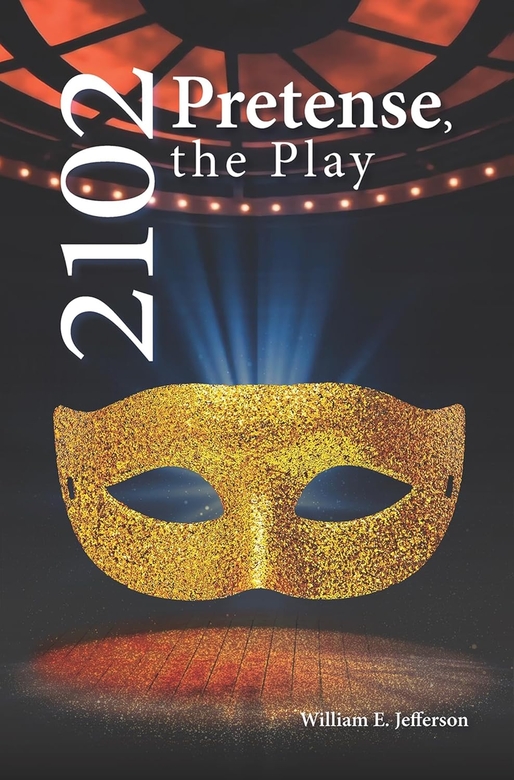
A lyrical and multilayered exploration of humanhood, intelligence, art, and the future of all three, 2102: Pretense, the Play by William E. Jefferson challenges form, function, and the rules of reality.
On a distant stage where technology and theatrical performance are inseparable, a scribe must attempt to capture what wisdom can be found in the tragedy of that time, and bring it back for those who might prevent it. Within that paradoxical premise, Quill is a writer caught in this “maddening drama,” but fortunately he has the sage company of a feathered friend, Loreto, to accompany him on his mission for profound theatrical content.
A bizarre trio of metaphysical musicians also joins him – Margin, Shadow, and Lesser Light – with these erudite incarnations landing somewhere between character, allegory, and literary device. Margin is the atemporal ambassador offering wisdom from the wings, Shadow is the tea-bearing messenger of all that remains hidden, and Lesser Light quietly reflects the timeless unavailability of the moon herself.
This quintet of watchers is soon drawn through the fourth wall of the future, participating and impacting the performance as much as any scripted role, and therefore being subject to verdicts and punishments alike. In this heady courtroom, the virtues and vices of mankind are judged, truth and deception are parsed, and it is up to Quill to decide where the masks end and the material begins.
Beyond the intangible elements of this esoteric plot, there are also coy explorations of artificial intelligence, DNA manipulation, the cruelty of capitalism, unnatural medical miracles, climate collapse, surveillance societies, and the fluid nature of knowledge. This deeply human drama concerns a disconnected future, one humanity is clearly careening towards with our devotion to and dependence on digital deities, where “the objects to be held became objects to behold,” for a sprawling and none-too-subtle takedown of media ecology and an essential critique of our societal addiction. Speaking to an ever-growing crisis affecting multiple generations, the author seeks to remedy the plague of our modern age, reminding people that online interaction and IRL connection are as different as “a portrait and face, a photo and place.”
Granted, these discussions are often embedded in scenes that make dream sequences seem sober, but for keen readers ready for revelation, this mind-expanding read will not disappoint. There are echoes of Shakespearean mischief in both the characters and the prose, with double entendres, wicked wordplay, and other bursts of verbal trickery that demand focus and attention. The flow of language is meticulous mayhem, and while a traditional storyline may feel elusive and frustratingly hard to grasp, that quicksilver slip of clarity is intentional. Both playful and profound in its execution, Jefferson layers his wit and wisdom in a spiraling spree of language, veering from the genius of poesy to the gleeful embrace of deep surreality.
Not every reader will glean the meaning of every moment in this densely crafted read, but whatever may be missing in comprehension, a deeper understanding of both present and future is inevitable, given the breadth and variety of the novel’s themes and prose. A clever celebration of the intellect, this is a deeply challenging, but wholly enriching work of literary fiction.
Book Links
STAR RATING
Design
Content
Editing
Get an Editorial Review | Get Amazon Sales & Reviews | Get Edited | Get Beta Readers | Enter the SPR Book Awards | Other Marketing Services























Leave A Comment